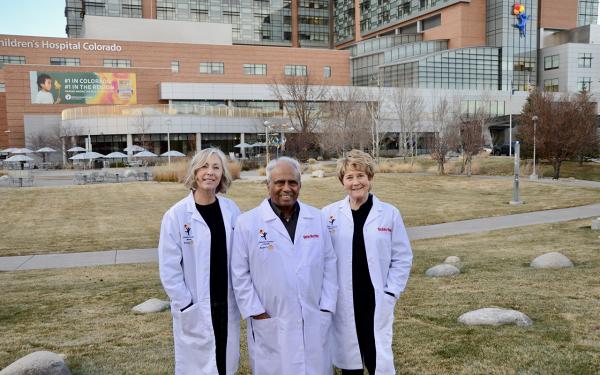
The Supply Pipeline | Rotary International
The supply pipeline
When a Colorado hospital system declared a youth mental health emergency, Rotary members jumped into action
Text: Etelka Lehoczky
The chief medical officer at Colorado Children’s Hospital had never seen anything like it. Suicide had become the leading cause of death among adolescents ages 10 to 18, and there were times in 2021 when the most common reason children were taken to the emergency room was to attempt suicide. With her hands full trying to keep the hospital running, the hospital’s CEO did something that had never happened before at the 113-year-old facility: She declared a state of emergency.
Similar scenes played out across the country as the COVID-19 pandemic exacerbated the mental health crisis among America’s youth and highlighted the consequences of health care shortages.
One in six children over the age of 6 in the United States has a diagnosed mental disorder. Yet only about half of them receive appropriate treatment.
Among those who took notice when Colorado’s hospital system sounded the alarm were three members of the Rotary Club of Highlands Ranch, a suburb of Denver. Within a year, they began raising funds to tackle the problem. Debby Doig, Shrin Murthy and Tamara Fennell spent more than a year traveling the state speaking to Rotary clubs about youth mental health. After nearly every talk, Doig said, they were approached by someone with a story.

Rotary Club of Highlands Ranch members (from left) Tamara Fennell, Shrin Murthy and Debby Doig pose in their honorary white coats outside Children’s Hospital Colorado. They raised $500,000 to establish the Rotary Club of Colorado Endowed Fellowship for Pediatric Mental Health.
Photo: Tamara Fennell
“They didn’t raise their hand and say it out loud, but they would come to one of us and whisper their personal tragedy in our ear,” says Doig. “Often it was suicide. Their child, their sister, their brother. I had one woman come up to us at a Rotary meeting and say, ‘Two weeks ago I tried to kill myself. And if it hadn’t been for Rotary, I wouldn’t be here now.'”
Statements like these strengthened the trio’s commitment to a bold goal: to raise half a million dollars to fund the training of pediatric psychiatry specialists.
That figure wasn’t even being discussed in early 2021, when Murthy learned of the crisis from a speaker at the Highlands Ranch Club. Among the most frightening developments was that younger and younger patients were presenting to hospital emergency rooms after attempting suicide. “We’re seeing increasing rates among 5- to 9-year-olds, if you can believe it,” says Dr. K. Ron-Li Liaw, the first chief of mental health at Children’s Hospital Colorado. “Elementary school-age children are attempting suicide.”
A few months after the hospital declared the emergency, three pediatric organizations declared a national emergency. Experts aren’t entirely sure what’s driving the crisis, but point to a number of causes. The pandemic isolated children and exposed many to the trauma of losing loved ones. More than 140,000 children in the United States lost a primary or secondary caregiver, or both, in the first 15 months of the pandemic.
Yet the number of children attempting suicide has been rising for years. Between 2016 and 2022, children’s hospitals in the U.S. saw a 166 percent increase in emergency room visits for suicide attempts and self-harm among children ages 5 to 18. That’s partly because there simply aren’t enough staff to treat troubled youth before their mental health problems become severe, says Dr. Cassie Littler, president of the Colorado district of the American Academy of Pediatrics. In the U.S., there are only 14 child and adolescent psychiatrists per 100,000 youth, and 70 percent of districts have no such professionals at all.
-
40+
Club visits during the fundraising campaign
-
$500,000
Total amount of funds raised to finance the foundation
-
1,500
Number of patients a fellow can treat per year
“It would make a huge difference if we had behavioral health specialists in pediatric offices,” Littler says. “A change in how prevention is funded would make a big difference because then we could intervene and help children and families learn these coping mechanisms and problem-solving skills.”
When Murthy first heard about the problem through his club, it didn’t immediately occur to him that he could do something about the shortage of suppliers. He just knew he wanted to take action in some way. “I said: we have to do something to address this crisis.”
Murthy and Doig formed a mental health committee within the Highlands Ranch Club and began researching opportunities. Murthy served on the volunteer board of Children’s Hospital Colorado and approached Martine Hyland, director of philanthropy for the hospital’s foundation, about possible donations. Hyland suggested several donation options with varying dollar amounts, but was surprised by the option Murthy and Doig chose. They wanted to fund a $500,000 scholarship to train new doctors in the mental health field.
“They said, ‘We want to do something big. We want to endow a scholarship,'” Hyland says. “And I have to tell you, I thought they were crazy. We’ve received many donations from various Rotary clubs, but nothing of this magnitude. I thought, ‘How are they going to do that?'”
First, Doig and Murthy convinced club member Tamara Fennell, who had worked for the National Alliance on Mental Illness for years. They told her about the benefits of a scholarship foundation. With a $500,000 endowment, the investment returns would be enough to fund training, a living stipend, and research opportunities for a new fellow every one to two years. They would actively address the physician shortage. And with a presence throughout Colorado, the hospital system would have a statewide reach.
A personal connection to the issue encouraged Fennell to support it. “My mother suffered from severe mental illness, bipolar disorder and obsessive compulsive disorder,” says Fennell. “And I’ve been a mental health advocate many times, so I was particularly excited about this project.”
There was just the small matter of raising $500,000. But Fennell was not intimidated by that number; she was excited. “When Shrin came to me and said, ‘Hey, I want to do this. What do you think?’ I was over the moon,” she says. “We would actually make a positive impact for countless children and families in the long term. That’s what’s special about it – it’s not a one-time effort. It’s a lasting legacy program.”

Fennell, Murthy and Doig with Martine Hyland (far right), director of philanthropy at the hospital’s foundation, during a check presentation.
Photo: Tamara Fennell
The three project partners prepared a presentation and contacted Rotary clubs in Colorado. The club in Highlands Ranch had its own foundation, which donated $50,000 to get things started. Then began the arduous work of visiting more than 40 clubs across the state. “We went from club to club and gave our presentation. We must have driven hundreds of miles,” says Murthy. “It was not an easy experience to go to these clubs and ask them for support. But then the money started flowing.”
Ultimately, it took about a year and a half to raise the funds, three and a half years less than the hospital’s foundation typically takes when groups try to raise that much money. But Murthy was determined to move quickly.
“I said to Debby and Tamie, ‘We need to get this done by September 2023 so we can award a fellowship in spring or summer 2024,'” he says. “The mental health problem has been getting worse every year. If we hire a fellow as soon as possible, that person can see up to 1,500 patients a year who otherwise would not get treatment.”
In addition to the money raised, Fennell says they have also made Rotary clubs and districts aware of the problem and hope that they will adopt the model in other places. “I don’t want to tell graduates how to improve their practices – I don’t have that ability,” she says. “But what I do have is the ability to share my knowledge of the crisis we are in and pass on my experiences.”
Out of: Rotary May 2024

Ethel Purdy – Medical Blogger & Pharmacist
Bridging the world of wellness and science, Ethel Purdy is a professional voice in healthcare with a passion for sharing knowledge. At 36, she stands at the confluence of medical expertise and the written word, holding a pharmacy degree acquired under the rigorous education systems of Germany and Estonia.
Her pursuit of medicine was fueled by a desire to understand the intricacies of human health and to contribute to the community’s understanding of it. Transitioning seamlessly into the realm of blogging, Ethel has found a platform to demystify complex medical concepts for the everyday reader.
Ethel’s commitment to the world of medicine extends beyond her professional life into a personal commitment to health and wellness. Her hobbies reflect this dedication, often involving research on the latest medical advances, participating in wellness communities, and exploring the vast and varied dimensions of health.
Join Ethel as she distills her pharmaceutical knowledge into accessible wisdom, fostering an environment where science meets lifestyle and everyone is invited to learn. Whether you’re looking for insights into the latest health trends or trustworthy medical advice, Ethel’s blog is your gateway to the nexus of healthcare and daily living.



